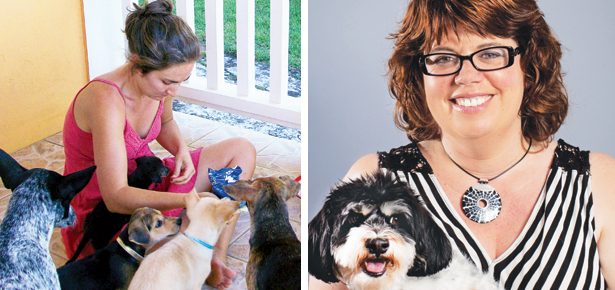
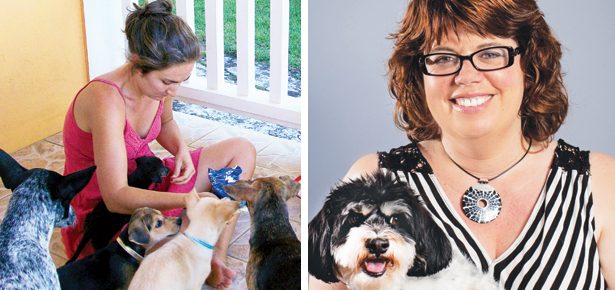
The Very Serious Side Effect to Dog Fostering
Why “foster failing” was the best thing to happen to these folks
The following folks found a common solution to this quandary, one that not only saves lives but oftentimes delivers a lifetime of happiness, too: they decided to adopt their foster dogs and became what rescue workers lovingly call foster failures. Read their stories at your own peril—there’s a very real risk you’ll find yourself signing up to foster dogs in your own community! (The rewards couldn’t be greater.)
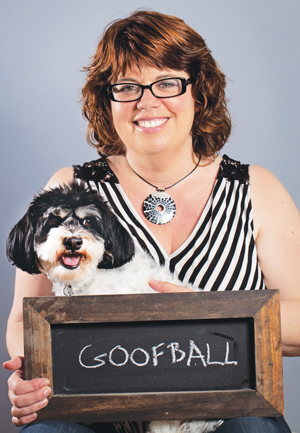
“We were hauling old furniture and cleaning weeds off the shelter grounds,” recalls Maria. “Just before we were ready to load out, a staff member on the premise asked my colleague, a vet tech, if she could take a look at a stray that was brought in. The dog had been hit by a car.”
Maria took one look at the dog’s scruffy face and wagging tail and knew she’d fallen hook, line, and sinker. The team decided to take Edie back to the city where she could be treated for her injuries, which unfortunately were serious: a broken femur and a broken pelvis, along with very matted fur. Edie vomited in the car on the drive back to the city and was admitted for treatment as soon as they arrived. Maria returned to work and her regular life. Yet, she couldn’t get Edie’s face out of her mind. When Edie’s recovery required some foster time, Maria stepped up to the plate knowing that Edie might not remain a foster dog for long.
“In the back of my mind the whole time I was thinking she would be a foster fail,” Maria smiles. “Knowing that I had a part in taking care of her while she was hurt, and knowing that back at the shelter she would likely have been euthanized…watching her evolve from a scared dog into a goofball—it’s a very rewarding experience.”
Now that Maria’s daughter has moved out, leaving behind an extra room, Maria plans to continue fostering and hopes to provide a safe haven for hospice animals in the near future.
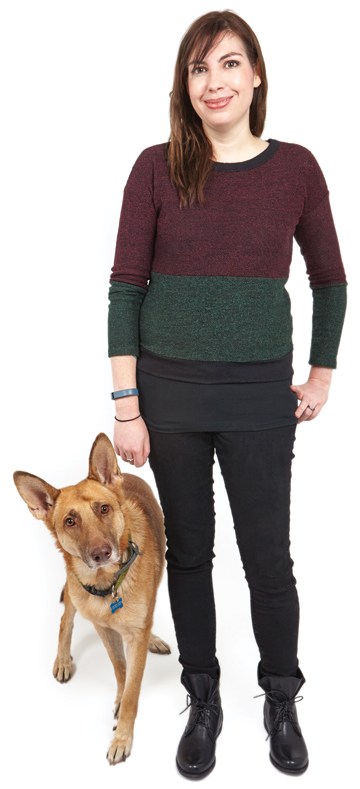
Lisa’s first foster dog Juniper was a shy senior dog with a heart defect and an estimated few months to live. Juniper needed a quiet neighbourhood, a yard, and a patient, loving caregiver if she was to stand a chance. Lisa, with her natural gravitation toward shy dogs, was the obvious choice. She agreed to a two-week foster trial, but a week into the arrangement, she knew she would adopt Juniper. Thanks to fundraising efforts, Juniper’s heart was treated and she lived for three healthy, happy years.
Lisa’s next two foster failures arrived together. Kaliska—a frightened, feral pup with neurological issues—and Fiona, a bereaved mama who’d lost all her pups to parvo. Both dogs were considered difficult to place, so were paired together and sent to Lisa’s “home retreat” for healing.
Lisa had lost Juniper two months prior and felt she was not ready to adopt, but she knew that without help, these two dogs wouldn’t make it so she agreed to simply foster.
“On the day I had to take them back, Kalisa bounded over to me and covered my face with kisses. This was a dog that was terrified of people.” Lisa didn’t need a clearer sign to tell her that Kaliska and Fiona were meant for her.
Lisa’s most recent foster failure, Clarabelle, was one among 58 dogs that were rescued by the Humane Society International from a South Korean dog meat farm earlier this year. Despite attempts to rehabilitate her, Clarabelle remained terrified and huddled in her kennel, refusing to eat, walk, or solicit affection. As a favour, Lisa agreed to foster Clarabelle through her heartworm treatment.
Several weeks in, a miracle happened. “One day, Fiona was standing in front of Clarabelle’s kennel and play-bowing to her, and it was like a light switched on. Clarabelle inched out of her kennel and started wagging her tail,” says Lisa. Clarabelle’s shyness around Lisa soon disappeared too and she became inseparable from Lisa’s other dogs. The band of misfits, as Lisa lovingly puts it, couldn’t be separated, so she adopted Clarabelle as well.
Lisa believes that dogs and people belong together. “Foster parents have a huge impact in dogs’ lives, and I encourage everyone to foster.”
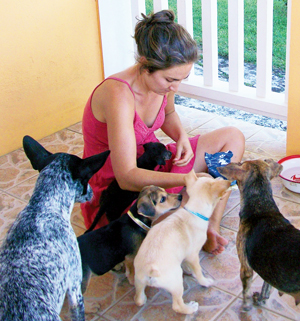
On a Sunday morning, Kiersten received a phone call from a panicked Japanese expat by the name of Yukiko. Yukiko lived on Bequia, an island off the mainland, and was horrified to see her neighbours were about to drown their dog and her puppies. Yukiko’s attempts to dissuade them had failed, and she needed someone to intervene quickly.
Bequia was a ferry ride away from the mainland and ferries didn’t run on Sundays. Kiersten begged Yukiko to convince the owners to hold off until she got there early the next day. The owners grudgingly agreed. When Kiersten arrived at their house the next morning, a malnourished dog greeted her from the yard. The dog was tied to a two-foot metal tether chain, with only a sliver of cement porch for shade and dirt for bedding. Kiersten watched the pups rooting through the filth in search of warmth. Ignoring the owners’ warnings about the dog’s “viciousness,” she approached her with a bowl of water and some kibble. Both disappeared in seconds. It was obvious she had been starved of food and deprived of fresh water for a long time. Suffice to say, the dog and her pups returned with Kiersten to the mainland. The pups were soon re-homed, but what of the mama dog?
“If I’d learned one thing since working with abused street animals, it was that animals have a sense about them,” she says. “They know when you’re there to help them, to save them, and to make them better.”
Kiersten named the dog Yuki after the Good Samaritan who interrupted her drowning and when Kiersten’s time on the Island ended, she decided to take Yuki with her back to America. Yuki now leads a charmed life with Kiersten, Kiersten’s boyfriend, and their four other dogs—three of which are also foster failures.
“It’s not easy, even today, having Yuki as a doggie daughter,” Kiersten says. “But she was meant to be our dog, and I was meant to be her person.” Yuki’s fear aggression is challenging at the best of times, but Kiersten views this “fail” to be just another opportunity to reconfirm her purpose in life—to love, be loved, and to do good things for all creatures great and small.
Join the newsletter and never miss out on dog content again!
"*" indicates required fields
By clicking the arrow, you agree to our web Terms of Use and Privacy & Cookie Policy. Easy unsubscribe links are provided in every email.